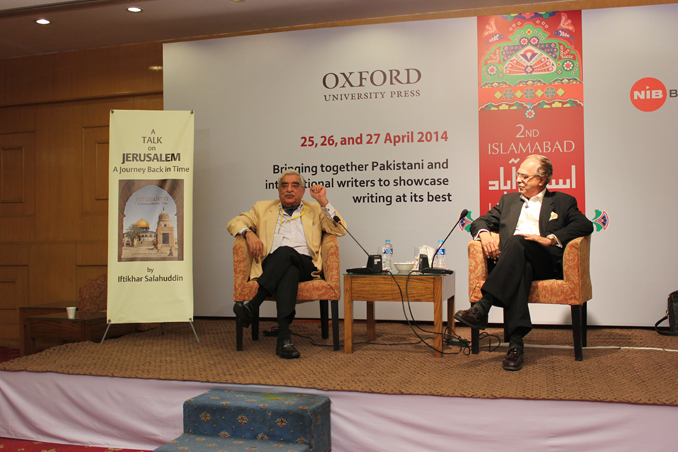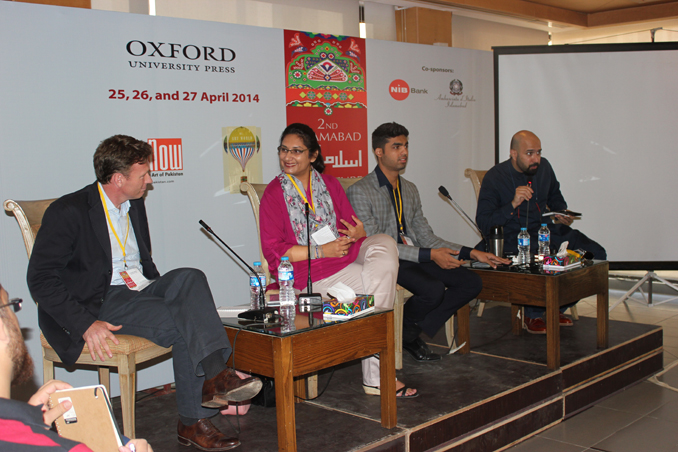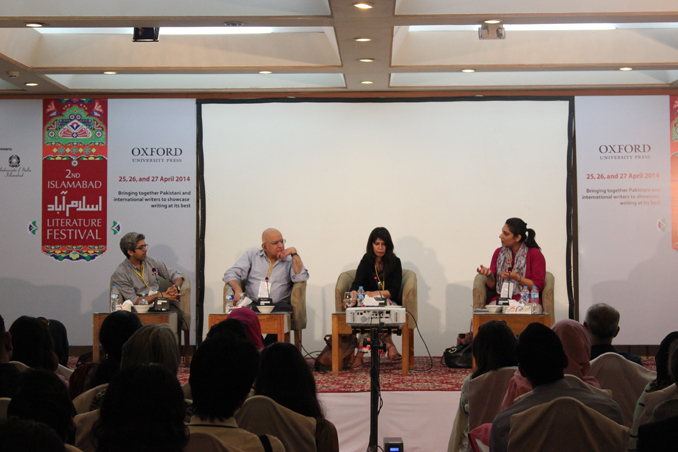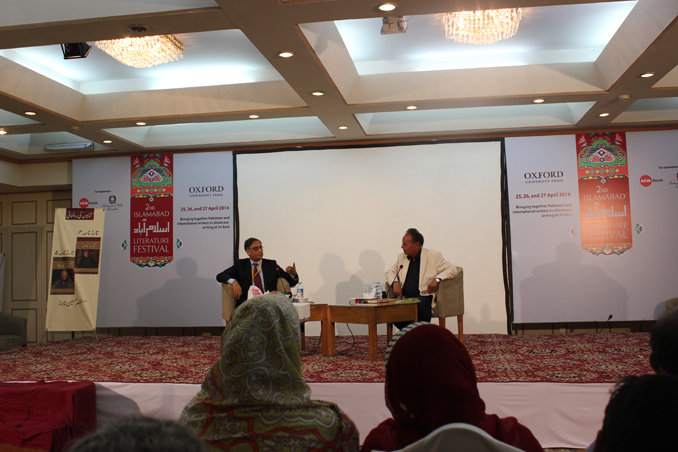(l-r) Nosheen Ali, Jamshed Dukhi, Nazir Bulbul and Aslam Saher
In what was arguably one of the most enjoyable sessions at the ILF, social anthropologist and poetry curator Nosheen Ali took the stage with Jamshed Khan Dukhi, Nazir Ahmed Bulbul and Aslam Hussain Saher, to eulogize the magic of poetry from Pakistan’s majestic North.
Ali thanked the panelists for undertaking the trip to the capital despite numerous difficulties, including unreliable flights, multiple changes of transport, and even covering part of the journey on foot. She began the discussion by asking Dukhi about the themes in his poetry, which focuses largely on sectarianism, ethnic strife, and what he feels is the cultural and political isolation of his region from the rest of the country. Dukhi, who writes in Shina and Urdu, spoke of the day to day socio-economic problems faced by locals of the resource rich region, and which he argues is not being provided even basic amenities on a sustained and ample level. “There are daily struggles we have to live with, and we write what we live in. How, then, can we write poetry about the bulbul?”
Nazir Ahmed, a Wakhi poet and singer, recited verses of his poetry in his native tongue and translated for the audience. Speaking on the impact of education in his home region, he told how families of his community saw things evolve within a generation; their children currently study in Islamabad while his and his parents’ generations had rarely ventured out of their own area. He discussed the work of the Wakhi Tajikistan Cultural Association in preserving the indigenous language, and shared that the people had established community schools where Wakhi was being taught to young children at an institutionalized level.
Balti and Urdu writer Aslam Saher, who heads the pioneering literary organization Bazam-Ilm-O-Fann and is Chief Editor of the regional daily Bedaar, spoke on how culture could best be promoted. He emphasized that without love, peace and harmony within a community and the atmosphere generated by them, the appreciation and preservation of culture and tradition was not possible.
The poets lauded eminent writer Mustansar Hussain Tarar in the audience for the twelve volumes he wrote on the North, expressing gratitude for his role in bringing the region to the rest of Pakistan. Poetry readings (see Featured Video) and enthusiastic appreciation from the audience brought the session to a close.
The team of the cult film Zinda Bhaag, which earned immense critical acclaim and was Pakistan’s official entry into the Oscars, discussed the state of cinema in Pakistan at the ILF. The young filmmakers explained how heartwarming it was for them to see how people had responded to the film and that it was a big surprise to them that a film of that small scale left such a huge impact.
The director of the film, Farjad Nabi, said how he has been told many times by true bred Lahoris that it is the only authentic film on the city. The discussion was made engaging with bursts of video clips of the film’s trailer and making.
The makers informed the audience of how tirelessly Naseeruddin Shah worked on the actors who were not professionals, but simply fit the part owing to their personalities.
The actors in the video clips detailed their experience on working on a film for the first time and how overwhelming it was for them.
Since music was an integral part of the film, the selection of the specific songs was dissected in the conversation. Meenu Gaur gave her perspective on the trends in playback singing in Pakistani cinema stating that as the hero in Punjabi films became an alpha male figure in the 80’s and 90’s, it was not considered masculine for the heroes to lip-sync songs. ‘’We wanted to have music as an important element of the film and to pay a tribute to the Pakistani cinema of olden times.’’
Abrarul Haq’s song, which was sung in an almost rap-like manner was, for instance, taken from a yesteryear composer, while Rahat Fateh Ali Khan was asked to sing a Qawali which he had not sung in a long time since his longstanding association with Bollywood love ballads. He essentially went back to the style of singing he started with when he began his career and, according to director Farjad Nabi, was quite stoked about singing the Qawali.
 |
(l-r) Najmuddin Sheikh and Dr. Iftikhar Salahuddin |
Dr. Iftikhar Salahuddin’s account of Jerusalem’s history interwoven with his journey through it, lasted the better part of an hour, and held his audience captive for every second. Najmuddin Sheikh, moderating the session, prefaced it with the words: “This book is not a mere travelogue or photographic collection, but a historical record on Jerusalem and its significance, as well as a love of labour.”
The slide show, accompanied by Dr. Salahuddin’s succinct narration, began with Abraham leading the Israelites to Canaan. “This was the land where God asked Abraham to sacrifice his son. It was where, centuries later, the Jews would build a sacred temple and where, centuries after that, the Prophet Muhammad (peace be upon him) would undertake his journey to the heavens. Jerusalem would thus be consecrated for three religions, forever.” Dr. Salahuddin spoke of the Israelites’ migration to Egypt, only to meet bondage and enslavement that would not be lifted till the time of Ramses II when Moses secured their freedom. Thus began the Exodus, and in their search for the Promised Land, Dr. Salahuddin continued, they took temporary reprieve in what is present day Petra, where Moses climbed Mount Sinai to receive the Ten Commandments. The histories of David and his son Solomon were touched upon, and the audience was told how “jinns worked under Solomon bringing precious stones and pearls from the sea” to construct the Temple of the Mount. The subsequent destruction of the temple, he continued, by the Babylonians conquering Judea, gave birth to the Jewish Diaspora; years later Cyrus of Persia defeated Babylon and endowed the Jews with riches to rebuild the Temple, but it was also fated to destruction, this time at the hands of the Romans under Titus.
Delving into Jerusalem and the Christian era, Dr. Salahuddin related how he traveled to Bethlehem by public bus “to witness first-hand the plight of Palestinians living in their own city”. Subsequent slides showed pictures he had taken: inside the Church of Nativity of the very spot where Jesus Christ was born, marked by a large star over which hang several lamps signifying the different denominations within Christianity; the room where the Last Supper took place; part of the Garden of Gathsemane where Christ had prayed the night the Romans took him; and the sepulcher Christ’s body was laid out on after his crucifixion on Golgotha Hill.
He went into Jerusalem under Muslim rule, relating the city’s surrender to the Caliph Umar, the Caliph’s refusal to pray inside a church for fear of setting an example that might deprive Christian worshippers their space, how the Caliph and his companions cleaned the Mount of Ascension, and the azaan by Bilal that was the first heard in that land. He also explained the procedure a Muslim must undergo to enter the Haram Sharif: each person is required to recite Surah Fatiha as proof of their faith.
Dr. Salahuddin continued with a description of the Crusades; there was particular mention of Salahuddin Ayubi’s conquest and how he restored all sacred to Islam in Jerusalem that had been desecrated during the Christian occupation of ninety years. The talk began winding down with the Ottoman period, from its beginning until its demise, and how subsequently in 1948 “Israel was created in the usurped land of the Arabs.”
The lights came back on to the sound of sustained applause.
 |
(l-r) Amb. Marcel De Vink, Bina Shah, Aziz Sohail and Wajahat Khan |
Wajahat Khan of Talk Back and Ikhtilaf fame led panelists Bina Shah, journalist and writer, Aziz Sohail, art curator, and His Excellency Marcel De Vink, Ambassador of the Netherlands, through an energetic and scintillating discussion on Pakistan’s cultural diplomacy, or the lack thereof.
Adopting a counter narrative approach, Khan set things off by having the discussants weigh in on the question, “Does soft power matter for a country like Pakistan which is struggling to meet even its most primal needs?”
Shah expressed her strong belief in the power and importance of cultural diplomacy, arguing, “It is the attraction of culture that brings people together from disparate cultures, disparate nations. It is a powerful tool in public diplomacy as it spearheads a softening of the ground for other ventures and initiatives to follow.” Echoing Shah’s views, Amb. De Vink stated that in a highly globalized world, countries need to project a certain image. “Soft power is so important because we cannot do without a narrative anymore; no one can.” Shah pointed out, in agreement, that building a narrative is how a country impresses upon other countries that they share certain values with the rest of the world.
The Ambassador added that diplomacy was not the exclusive domain of governments. Leading in from this latter remark, Sohail discussed how cultural diplomacy was not fostered by the state machinery alone. “It has public ownership, and that, very importantly, is where the youth comes in.” He also pointed out the importance of “intra-country diplomacy”, referencing the need for creating favorable perception, acceptability, appreciation and a sense of oneness within a country’s various ethnicities or provinces for each other.
When asked by Khan how, with an outsider’s perspective, he would project Pakistan if he were the country’s cultural ambassador, Amb. De Vink said the most critical thing that would need to be decided is what image Pakistan wished to project, as that was the single most important determining factor in deciding how to promote the country’s soft image abroad.
 |
(l-r) Bilal Tanwir, Aamer Hussain, Sabyn Javeri and Bina Shah |
The art of the short story in the Pakistani English literature landscape was defined and elucidated at this year’s festival. The session moderated by writer Bilal Tanweer, who recently launched his first book, The Scatter Here is too Great, began with each panelist recounting a short story novelist that inspired their own work. Short story doyen, Aamer Hussain, praised the work of Italian writer Natalia Ginzburg whose employment of language influenced him regarding how to present language in a pure way that translates into any language beautifully. What he replicated was the art to “aim for simplicity” while simultaneously “create fluidity in the form”, in constructing the narrative of his short stories.
Award winning writer Sabyn Javeri instantly named Lebanese writer Hanan Al Shaykh whom she cited as the reason for “wanting to write and not just read”. Al Shaykh’s work represented the universal nature of fiction; that it did not matter how foreign a world was, it could easily become relatable, and while Hanan wrote in English she beautifully brought forth the Arabic flavor to the text. It gave Sabyn the confidence to write in English and yet bring the flavours of Karachi in her short stories. Best-selling author Bina Shah, who found it puzzling to nominate just one author, gave credit to Aamer Hussain, from whom she learnt how to sculpt her stories and learnt from his mode of compassion and his portrayal of real women. Over the years, she had opportunities to meet him and often send her work to him for feedback.
While debating the merits of a novel versus the short story, Aamer Hussain articulated that the novel was a momentous task, a body of work, ideas and characters that you have to live with for a long time. Bina Shah related that though oftentimes people claim that the short story is practice for the novel, in fact it is a completely different animal and that the two exist in different spheres altogether. What you preferred as writer and reader depended on the nature of each individual person.
 |
(l-r) Asif Farrukhi and Mustansar Hussain Tarar |
Co-Founder of the ILF, Asif Farrukhi, convened one of the final panels at the close of Day II with distinguished columnist, novelist and travelogue writer, Mustansar Hussain Tarar.
Farrukhi began by asking Tarar Sb why he went into travelogue writing, to which the latter responded that it hadn’t been a planned decision. “I am an incidental writer, not an intentional one. I’ve never really travelled with the intention of writing and there are countless trips I’ve undertaken that I’ve never written about. The only exception to that is an upcoming book I wrote about the Xinjiang province of China, titled ‘From Lahore to Yarqand’, which was written at the request of the government of Xinjiang. They took me and my wife on a tour of their region and I wrote a manuscript on our travels.”
He expressed his belief that the greatest gift of penning a travel experience was that you could re-live it, and cited his book ‘Ghaar-e-Hira Mein Ek Raat’ (‘A Night in Cave Hira’). “I spent one night in that cave, but I needed over half a year to translate my complete experience onto paper.” Speaking on fiction and its readers, Tarar Sb remarked that readers of a few decades ago were simple, almost uninitiated in their tastes, and demonstrated an innocent acceptance of what a writer presented to them, but today, “readers have had exposure to so much reading of various kinds from the world over that they demand literature of a certain level; they know what they want.”
Farrukhi asked the author where his ideas came from, and Tarar Sb cited the inspiration for his novel ‘Bahao’ (‘The Flow’). “I awoke in the middle of a hot night to drink water. In my semi-awake state I felt the level of water in the clay cup was lower when I drank a second draught; that stuck in my consciousness. Some days later I read a statement in a publication, that said ‘In ancient times, the mythical river Saraswati used to flow here and dried up for unknown reasons.’ That’s how Bahao began to take birth. Rivers signify civilizations and life; I began thinking of how and why rivers die, and of the tremendous responsibility faced by a person who first begins to notice the drying up of a river his community is dependent on.”
The session ended with a reading from one of his recent Urdu columns (see Featured Video).
’From Lahore to Yarqand’ is a joint product of the Pakistan-China Institute and the Information Office of the People’s Government of Xinjiang Uyghur Autonomous Region
The report launched by the Human Rights Commission of Pakistan last Thursday concluded that “no less than 800 honour killings took place, 56 women burnt alive, 65% of the men answered positive that violence against women is justified”. The snippet from the report was read out by Salman Asif and established the tone of melancholy yet urgency in the matters relating to women in South Asia. Feryal Ali Gauher, known women’s right activist, read a cruel and violence description of abuse against women from her first published book. Her argument being that the narrative of female oppression is not challenged in today’s society and that the death of a woman is no more sorrowful than the death of a dog.
Aasim Sajjad Akhtar from the Awami Workers Party (AWP) connected the problem of violence to the everyday structural violence that is linked to the rigid class structure in society. He emphasized the need for people to identify the movements and struggles that are taking place and for these proliferated and scattered movements to band together under the umbrella of the left. He censored the right, both religious and secular, for their inherent chauvinism that needs to be countered by a powerful and coherent left.
Ritu Menon, a prominent figure from the women’s movement in India, addressed the core of the issue by stipulating essential facts. “The findings of the report are not surprising,” she stated, “but the fact that they continue, that is surprising. All these things have been said before and yet women are at the same place they were a 1000 years ago.” It was important that this violence against women would only end once men entered this movement and once we learnt to change our terminology and definitions. The panelist argued for greater accountability from not only members of society, but from the State, that unabashedly supports violence against women. Although, the session drifted very quickly towards the topic of violence against women, it would have been interesting to hear more on the subject of the session “Gender Matters.”
You may also like: